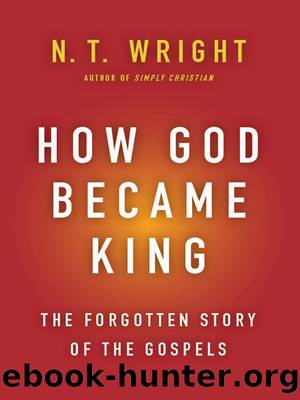How God Became King: The Forgotten Story of the Gospels by N.T. Wright

Author:N.T. Wright
Language: eng
Format: mobi
Tags: Christian
ISBN: 9780061730603
Published: 2016-03-02T00:00:00+00:00
There it is. The kings of the earth exercise power one way, by lording it over their subjects, but Jesus’s followers are going to do it the other way, the way of the servant. You might almost think Mark thought Jesus had been reading Isaiah 40–55, where the “servant of the LORD” and his shameful death are the means by which, somehow, the gods and rulers of Babylon are overthrown, Israel is rescued, and God himself returns to Zion to renew not only the covenant, but the whole creation. And Mark (followed by Matthew) also highlights Jesus’s words about the vindication of the “son of man,” which by its evocation of the whole narrative of the book of Daniel declares, as powerfully as any statement to a scripture-soaked audience could do, that, despite present suffering and disappointment, Israel’s God is indeed going to take his seat and, in vindicating the one who represents his suffering people, pass judgment on the monsters, the pagan powers, that have arrogantly taken charge of the world.
There is, in other words, a clear line all the way from Genesis 11, via Isaiah 40–55 and Daniel 7, to Mark 10, and thereby in turn to Mark 14–15, where Jesus meets his captors, his judges, and his death. He not only theorizes about the difference between pagan power and the kind of power he is claiming; he enacts it. The passage just quoted is not a “political” statement (about different types of power) followed by an “atonement” statement (about how sins would be forgiven), as though the two were entirely separate things. As we shall see in the next part of the book, when we put together “kingdom” and “cross” in a way few readers of the gospels have even tried to do, Jesus establishes the new kind of power—God’s kingdom as opposed to Caesar’s, on earth as in heaven—precisely through his (scripturally interpreted) death. And, to put it the other way around, God rescues his people from their sins, through the work of the Isaianic “servant,” precisely in order to establish his rule, his own very different kind of power, in all the world.
It should already be clear from this that the music we are now hearing from the fourth speaker harmonizes very well indeed with the music we heard from the first (the story of Israel). Indeed, once we understand that, we may also glimpse one possible reason why both have been turned down so low or even off altogether. If this story of Jesus is the story of Israel reaching its climax, it is inescapably political and will raise questions the Western world has chosen not to raise, let alone face, throughout the period of so-called critical scholarship. The post-Enlightenment world was born out of a movement that split church and state apart and has arranged even its would-be historical scholarship accordingly; and that same Enlightenment insisted that Judaism was the wrong kind of religion, far too gross, too material. Rejection, from the start, of a “political” reading of the gospels and of a “Jewish” reading went together.
Download
This site does not store any files on its server. We only index and link to content provided by other sites. Please contact the content providers to delete copyright contents if any and email us, we'll remove relevant links or contents immediately.
The Lost Art of Listening by Michael P. Nichols(6472)
Why I Am Not A Calvinist by Dr. Peter S. Ruckman(3769)
The Rosicrucians by Christopher McIntosh(3049)
Wicca: a guide for the solitary practitioner by Scott Cunningham(2704)
Signature in the Cell: DNA and the Evidence for Intelligent Design by Stephen C. Meyer(2501)
Real Sex by Lauren F. Winner(2474)
The Holy Spirit by Billy Graham(2416)
To Light a Sacred Flame by Silver RavenWolf(2353)
The End of Faith by Sam Harris(2289)
The Gnostic Gospels by Pagels Elaine(2026)
Nine Parts of Desire by Geraldine Brooks(2006)
Waking Up by Sam Harris(1958)
Heavens on Earth by Michael Shermer(1955)
Devil, The by Almond Philip C(1899)
Jesus by Paul Johnson(1887)
The God delusion by Richard Dawkins(1848)
Kundalini by Gopi Krishna(1824)
Chosen by God by R. C. Sproul(1760)
The Nature of Consciousness by Rupert Spira(1689)
